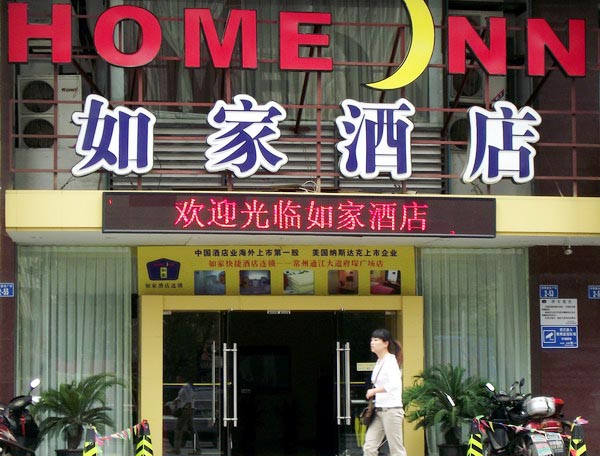They are also looking to enter different market sectors in the hunt for profits
China's budget hotels are subdividing into different sectors during a rapid expansion that has been ongoing around the country since 2009.
"The segment markets will be the direction for China's budget hotel business in the future," said Ye Bingxi, the senior public relations manager at Home Inns and Hotels Management Inc, which is China's largest budget hotel company by the number of properties.
The middle and high-end business hotel is Home Inns' market position. The company has run its high-end brand, Yitel, since 2008. Yitel, where average prices are about 600 to 700 yuan ($110.04) a day, has four hotels in three cities now.
|
 A Home Inns hotel in Changzhou city, in East China's Jiangsu province. Home Inns suffered a loss in net profits in the first quarter of 2012 because of an operating loss by Motel 168, according to its financial report. [Zhen Huai/Asianewsphoto] |
Yitel will have about 50 hotels by 2015, Home Inns said.
Another significant budget hotel company, 7 Days Group Holding Ltd, is also expanding its business to middle-end hotels. Zheng Nanyan, board chairman of the company, said his first middle-range hotel will be launched this year. Some companies are going downmarket while some are expanding into the upper market.
Jinjiang Inn Co, the fourth largest budget hotel company in China by the number of hotels, has a brand name Bestay Hotel Express targeting the lower end of the market with prices from 100 yuan a night. Bestay Hotel Express has had about 60 hotels around China since 2009.
Smaller players are also trying to find development opportunities from the segment market.
"Pod Inns' position is fashion and the younger group," said Zhu Hui, founder and chief executive officer of Pod Inns.
The company's consumer database also reflects its position.
The main customers are young people aged between 18 and 35 years with 2,000 to 6,000 yuan monthly incomes, he added.
In order to match its position, rooms in Pod's 200 hotels are smaller than other budget hotels. The company pays more attention to other facilities, such as Wi-Fi, Apple Inc computers and Skype to lure its target audience.
Pod's operation was appreciated by venture capitalists with the company receiving $55 million in investment in June. The money will be used for future expansion, Zhu said.
"Pod will expand to more than 500 hotels from its current 200 in the next three years," said Zhu.
Unlike the main industry players, which are working on entering the smaller cities, big cities will be the ambitious small company's main target in the future.
The number of Pod hotels in Beijing will increase from the current 12 to more than 100 by 2015, Zhu said.
